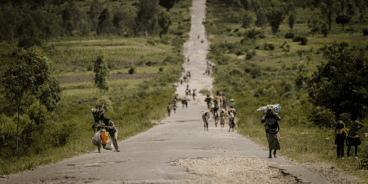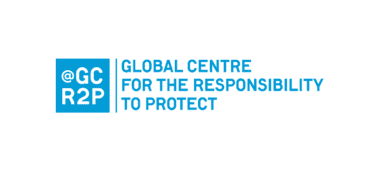
Atrocity Alert No. 92: Democratic Republic of the Congo, Syria and the International Criminal Court
Atrocity Alert is a weekly publication by the Global Centre for the Responsibility to Protect highlighting situations where populations are at risk of, or are enduring, mass atrocity crimes.
22,000 Congolese flee renewed ethnic violence in the northeast
Ethnic violence between members of the Hema and Lendu communities in the Democratic Republic of the Congo (DRC) threatens tens of thousands of civilians in the northeast of the country. During the last week several villages have been completely abandoned in Ituri province, while others have been burnt down. According to the UN Refugee Agency (UNHCR), over 22,000 people have fled across Lake Albert to Uganda since violence broke out on 2 February.
The Hema and Lendu ethnic groups have a long history of conflict, including several years of intense fighting in Ituri province that started in the late 1990s and resulted in thousands of deaths. The Hema are predominately pastoralists and the Lendu are mainly farmers, with longstanding disputes over control of land and resources. External forces have previously exacerbated these divisions, providing support to one ethnic-based militia or another.
The rapidly deteriorating situation in Ituri province adds to the country’s enormous humanitarian crisis. There are now over 4.5 million displaced people in the DRC and over 650,000 refugees in neighboring countries. Over 240,000 Congolese were already seeking sanctuary in Uganda as of December 2017, and an additional 34,000 people have arrived so far this year as a result of ethnic violence in Ituri and the government offensive against militias in North Kivu province. However, according to UNHCR only one percent of their $386.7 million humanitarian appeal for the Congo has been funded so far this year.
The DRC government and the UN peacekeeping mission (MONUSCO) should urgently deploy troops to Ituri province in order to contain the fighting and prevent atrocities. Ituri province must not be allowed to deteriorate into sustained ethnic violence and instability.
Nine healthcare facilities bombed as Syria’s war on civilians continues
Over the last week Syrian government forces and their Russian allies have continued their assault on the opposition-held regions of Idlib and eastern Ghouta, with relentless airstrikes resulting in the deaths of hundreds of civilians. According to the UN Office of the High Commissioner for Human Rights, at least 277 civilians were killed and 812 wounded between 4 and 9 February alone in some of the most intense bombing since the start of the nearly seven-year war.
At least nine medical facilities – three within eastern Ghouta and six within Idlib governorate – have been targeted and severely damaged. According to the UN Children’s Fund (UNICEF), dozens of children have been killed. Airstrikes on residential areas of Douma, eastern Ghouta, reportedly killed 31 civilians, including four children, on 6 February alone. On 10 February the High Commissioner for Human Rights, Zeid Ra’ad al-Hussein, condemned “wave after wave of deadly airstrikes” on Idlib governorate and eastern Ghouta, saying that “even by Syria’s atrocious standards, these are exceptionally deplorable developments – and a cruel irony given that both have been declared ‘de-escalation areas’.”
Deliberate attacks on medical facilities and the use of indiscriminate weapons in civilian populated areas demonstrate a complete disregard for International Humanitarian Law and International Human Rights Law, and amount to war crimes. They also directly contravene UN Security Council Resolutions 2286 and 2139.
As the seventh anniversary of the Syrian conflict approaches, the Security Council must bridge their partisan divisions and take proximate steps to uphold their responsibility to protect Syrian civilians. The broader international community should intensify efforts to hold all those responsible for alleged war crimes and crimes against humanity accountable, including via the UN’s International, Impartial and Independent Mechanism to assist in the investigation and prosecution of perpetrators of atrocities in Syria.
International Criminal Court initiates examinations of Venezuela and the Philippines
Last Thursday, 8 February, the Prosecutor of the International Criminal Court (ICC), Fatou Bensouda, announced the opening of preliminary examinations into the situations in Venezuela and the Philippines. The Rome Statute entered into force in Venezuela in 2002 and in the Philippines during 2011, giving the ICC jurisdiction over genocide, crimes against humanity and war crimes committed on their respective territories or by their nationals.
The preliminary examination of the situation in the Philippines will probe crimes allegedly committed since July 2016 as part of the so-called “war on drugs” launched by President Rodrigo Duterte. Since then it is estimated that over 9,000 people have been extrajudicially killed for their suspected involvement in the illegal drug trade, although the number of deaths is likely much higher. More than 4,000 people have been killed in police operations while thousands of deaths have been attributed to unidentified vigilantes who carry out executions of alleged drug offenders, often with scant evidence of any actual illegal activity. These killings may amount to crimes against humanity.
The preliminary examination of the situation in Venezuela will look into crimes allegedly committed since April 2017. During 2017 state security forces used excessive force to disperse and suppress anti-government demonstrations, resulting in the deaths of at least 120 people. Thousands of activists and members of the political opposition were also arrested and detained, with many allegedly subjected to ill-treatment and possible torture. In a July 2017 report to the Organization of American States, Secretary General Luis Almagro claimed that these acts may constitute crimes against humanity.
Preliminary examinations enable the ICC to reach a determination on whether there is a reasonable basis to proceed with a formal investigation of atrocity crimes, potentially resulting in prosecutions. The governments of the Philippines and Venezuela should fully cooperate with the ICC, and should conduct credible domestic investigations of all alleged human rights abuses.


